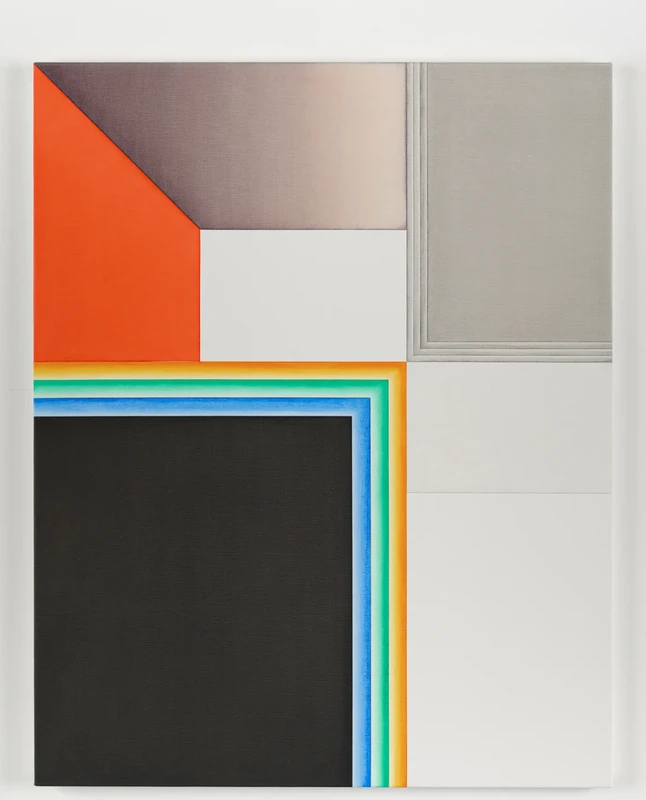Selma Parlour: Yonder Cloud
8 Oct-28 Oct 2022


HAMLET: DO YOU SEE YONDER CLOUD
THAT’S ALMOST IN SHAPE OF A CAMEL?
POLONIUS: BY THE MASS, AND ‘TIS LIKE
A CAMEL INDEED.
HAMLET: METHINKS IT IS LIKE A WEASEL.
POLONIUS: IT IS BACKED LIKE A WEASEL.
HAMLET: OR A WHALE?
POLONIUS: VERY LIKE A WHALE.
Having created a unique visual vocabulary comprising diagrammatic space, framing, trompe l'oeil illusion, haptic surfaces, transparency, repetition, and of course, colour, Selma Parlour is known for her meticulous oil paintings that appear as though they are drawn, dyed, or printed.
These elegant paintings belie a rigorous process that sees the weave of the soft linen substrate exposed within colour. And, colour – pastel, vivid, sour – is ‘backlit’ by the white primer beneath creating a glow reminiscent of the photograph or screen.
From Piet Mondrian’s homogenisation of pictorial space, to Jonathan Lasker’s impasto lattices and Heimo Zobernig leaving his masking tape attached to his canvas, the modernist grid is synonymous with an assertion of painting as a literal object, over and above its facility for illusion.
Conversely, Parlour reimagines the grid as a site for illusion. For Yonder Cloud, her grids are patterns of relation but they can also be read as codified representations of multiple paintings in a salon hang. While an abstract painting commenting on the pragmatics of its display is familiar territory for abstraction (e.g., Robert Ryman), in her Salon Paintings Parlour uses abstraction to re-present representation as such. Or, as a certain surrealist might have put it: this is not a salon hang.
With her playful reworking of historical parameters Parlour underscores the disparity between what we see and what we interpret. Meaning lies with what the viewer bestows – this succinctly illustrated by Parlour’s reflexive approach to painting, as it is with Shakespeare’s ‘yonder cloud’ exchange.
Parlour’s dedicated investigations into the in/extrinsic limitations of painting as a medium have led the artist to these illusory, abstract works. With her attentiveness to the liminal space between painting’s objectness and the image, her paintings truly question our impression of tangible space and surface.
Selma Parlour (b. Johannesburg S.A 1976,) received her PhD in Art from Goldsmiths, University of London. Awards include an Arts Council England Creative Development Award (2020); the Mark Rothko Memorial Trust Artist-in-Residence Award (2018); the Sunny Dupree Family Award for a Woman Artist, the Summer Exhibition, the Royal Academy of Arts, London (2017); and John Moores Painting Prize (prizewinner, 2016). Other notable awards are a runner-up award from the Arts Foundation; and Thames and Hudson’s international competition and publication ‘100 Painters of Tomorrow’ (both 2014). Solo exhibitions are: ‘Warp & Weft’, Dio Horia Acropolis, Athens (2022); ‘Selma Parlour,’ Pi Artworks Istanbul (2020); ‘Activities for the Abyss’, Pi Artworks London (2019); ‘Upright Animal’, Pi Artworks London (2018); ‘Parlour Games’, a site-specific installation with Marcelle Joseph Projects, House of St Barnabas, London (2016); ‘Paradoxes of the Flattened-out Cavity’, Dio Horia, Island of Mykonos (2015); and ‘Selma Parlour’, MOT International, London (2012). Selected group exhibitions: ‘Superfice’, Coleman Projects, London; ‘Harder Edge’, Saatchi Gallery, London; ‘Selma Parlour & Yelena Popova’, Horton Gallery, New York; and Bloomberg New Contemporaries, ICA, London. Collections include the Saatchi Gallery, London; Laure Genillard Gallery, London; and the Creative Cities Collection, Beijing. Pi Artworks is proud to announce that the artist has won an Abbey Fellowship in Painting at the British School at Rome. Parlour will take up her 3-month residency in Rome in Spring 2023.